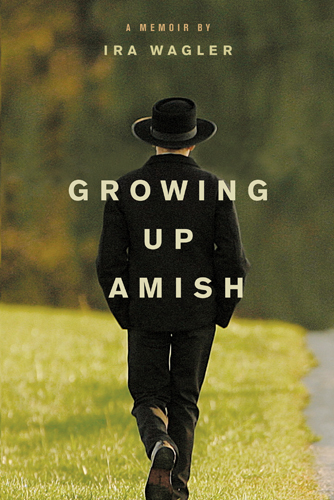
Growing Up Amish
A Memoir
کتاب های مرتبط
- اطلاعات
- نقد و بررسی
- دیدگاه کاربران
نقد و بررسی

June 13, 2011
Filmmakers, academics, and novelists have offered depictions of Amish life. This memoir offers a nuanced account from a man who straddled both Amish and "English" (non-Amish) worlds. Wagler recounts his Amish upbringing, from dating conventions and worship services to local gossip and schoolyard bullies. The simplicity of everyday life may seem quaint on the surface. Yet Wagler bravely goes on to expose pervasive dissatisfaction among both youth and adult Amish living in what he characterizes as a stifling, formulaic world. Such unspoken displeasure sparked a cycle of coming and going for the author, who repeatedly crept away from his community only to return, if reluctantly, for its familiarity. It was a "paradox that would haunt me for almost ten years: the tug-of-war between two worlds." His tale of restlessness looks acutely at the clash of family ties with love of freedom. The memoir is worthwhile as much for its Amish insights as for its exploration of one man's emotional turmoil, regret, and shame. Wagler, who now works at a building and supply company in Lancaster County, Pa., deserves praise for his honesty.

Starred review from June 1, 2011
An affecting memoir from a former Old Order Amish member who abandoned his structured family life for autonomy in the free world.
Wagler, the 9th of 11 children, recalls his family settling in the "somewhat progressive" southwestern Canadian township of Aylmer in the 1960s. They enjoyed running water on the farm, unlike other more conservative Amish collectives bound by what Wagler calls the "inordinate fussing" of horse-and-buggy travel, forbidden electric and telephone service, home-sewn dresses for women and beards for men. His farm years are fondly and unhurriedly conveyed in ponderous reflection as Wagler admits to rarely ever being bored growing up (three-hour church services were the only exception). As his teenage years hit, resistance to the rigid Amish rules simmered while the family uprooted themselves to a burgeoning Amish community in Bloomfield, Iowa. There, Wagler experimented with the worldly temptations of the outward "English society" during his traditional adolescent "Rumspringa" period, but, at 17, the itch of independence became a calling he couldn't deny or resist. Late one night, armed with a duffel bag and $150, he left home. In engrossing, straightforward prose, the author passionately describes the ensuing five years he spent rationalizing his desire to join the outside world while he grappled with the tidal pull back to familial safety and stability. This created an exasperating cycle of secretive departures and humbling homecomings; even an attempt at love was dashed in favor of fleeing once again. The collective shunning by the Amish church proved a double-edged sword for the author; while sorrowful, it finally brought necessary closure to Wagler's youthful wanderings, yet taught him how to "leave and not be lost."
Boldly goes where many Amish chronicles fear to tread: the exodus of members seeking an unencumbered lifestyle.
(COPYRIGHT (2011) KIRKUS REVIEWS/NIELSEN BUSINESS MEDIA, INC. ALL RIGHTS RESERVED.)

October 1, 2011
This book joins several others recently published on the now popular subject of Amish life. In his memoir, Wagler chronicles growing up in an Iowa Amish community and eventually leaving it. First written on his blog at www.irawagler.com, the narrative unfolds well for a first book. Wagler's writing portrays the conflicting emotions of breaking away from the family and faith he loves because of his need to break free from a life that didn't suit him. The distinct feature of this story is that through all of his teen angst and turmoil, during which he left the Amish, he did not lose his faith in God. He was able to find another faith community to identify with. This engaging memoir doesn't lag but keeps the reader interested all the way through. VERDICT Fans of all things Amish, as well as those interested specifically in spirituality, will find this a good read. It serves as a nice addition to previous books written on the subject.--Holly Hebert, Brentwood P.L., TN
Copyright 2011 Library Journal, LLC Used with permission.

Starred review from May 15, 2011
Like many other memoirs, this is the record of an unhappy youth. It reports no physical or mental cruelty, however, other than a four-year-olds overly candid remark and commonplace, though still sickening, schoolyard bullying. What readers may see as cultural crueltythe doctrinaire social archaism of the AmishWagler probably doesnt and never did. Yet he rebelled against his upbringing because he wanted to live in a wider world. As a young teenager, he and five buddies conspired to smoke and drink. When he was 16, he sneaked away from home in the night, leaving a note under his pillow. He worked on a cattle ranch for several months, then went back home.It was the first of many departures and returns, until he met a very rare person, a convert to the Amish (who as, Wagler says, have been vanishingly few) who made him confident in his Christianity, thereby enabling him not to come back but to leave permanently. Wagler grinds no axes; this is not an argumentative or polemical book. Chaste in vocabulary, limpid in exposition, masterfully but never self-importantly focused on its authors experience and reflection, it is a fine literary achievement as well as a calming reassurance that Christianity is a religion, not an institution.(Reprinted with permission of Booklist, copyright 2011, American Library Association.)

























دیدگاه کاربران